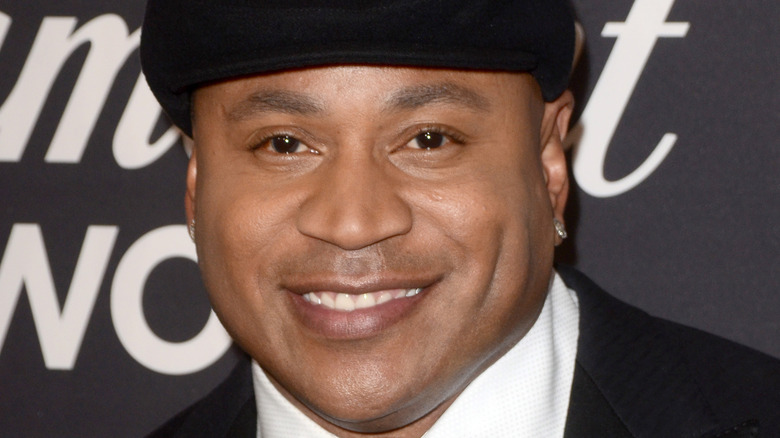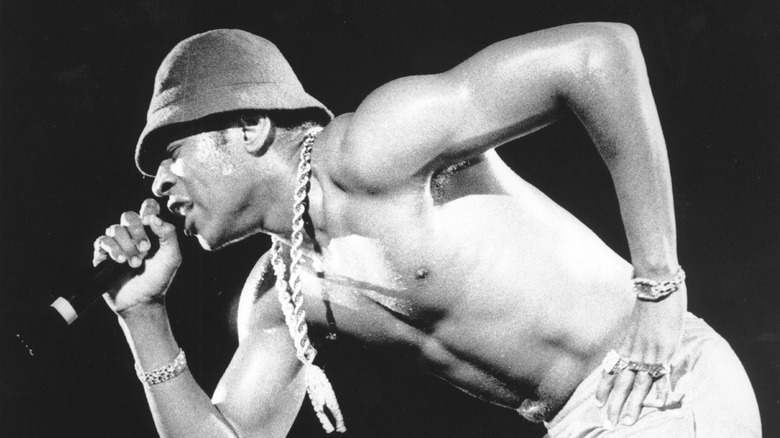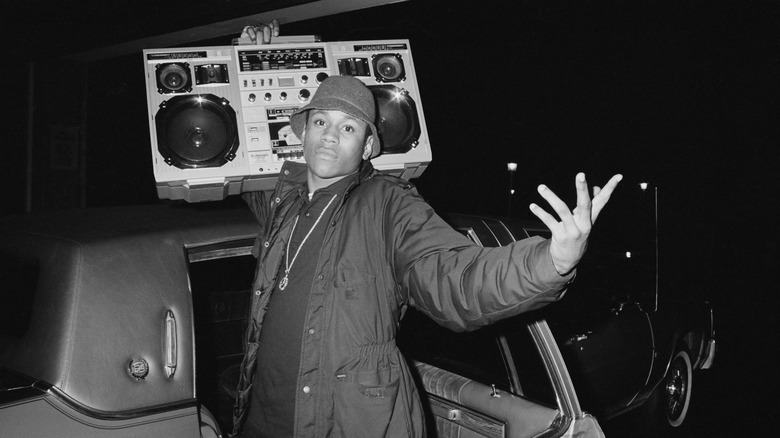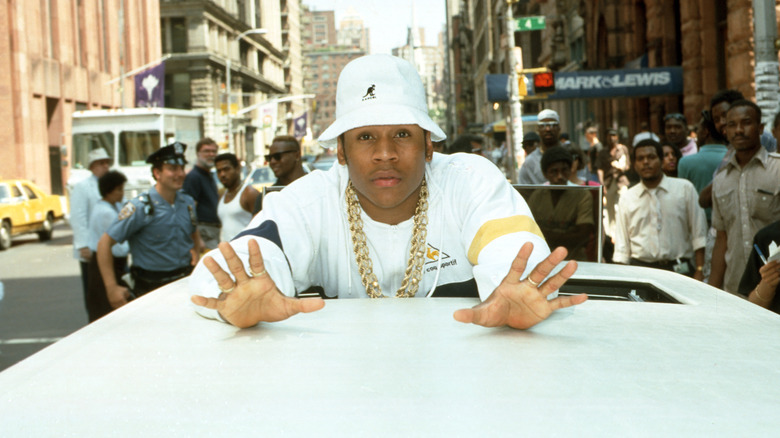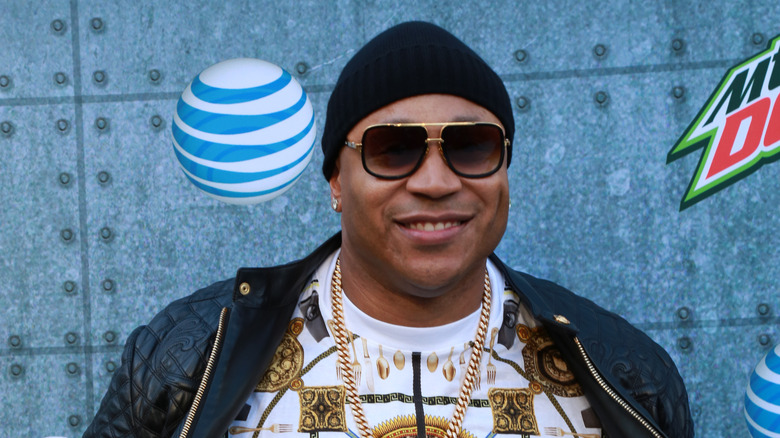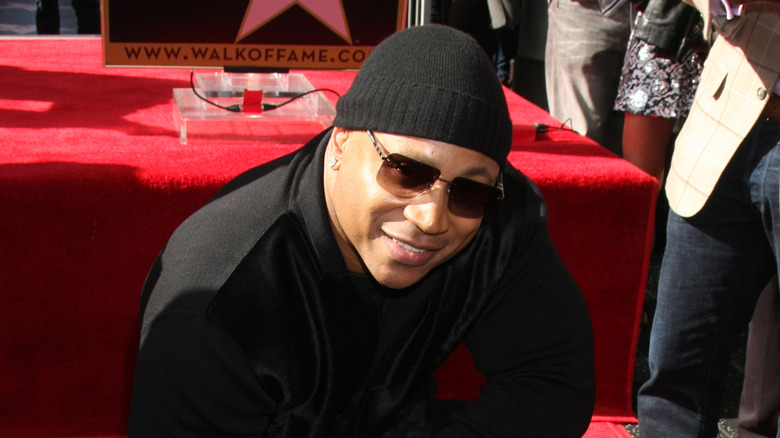Tragic Details About LL Cool J
LL Cool J (born James Todd Smith, per Britannica) has been a fixture in the pop culture landscape for several decades now. He got started in the then-emerging genre of hip-hop in the 1980s, becoming one of the first artists in the field to find mainstream commercial success. His hits, including "Mama Said Knock You Out," "I Need Love," and "Going Back to Cali" remain high-water marks of the genre, long after they were released.
Smith, meanwhile, transitioned from musician to actor later in his career, appearing in films such as "In Too Deep" and "Any Given Sunday." These days, he's mostly known for his TV work, particularly as Agent Sam Hanna on "NCIS: Los Angeles."
Though he's at the top of his game professionally, Smith's life hasn't always been easy. Born into a troubled and dysfunctional family, LL Cool J witnessed his share of tragedy, even including a murder. Further, as an adult the rapper has dealt with having to learn that his family wasn't quite what he thought it was, as well as having to lose friends and colleagues in the music and entertainment business even as his star rose.
LL Cool J witnessed his father trying to murder his mother and grandfather
LL Cool J was born in 1968 in Queens, New York, according to Amomama, in a tough neighborhood where drug abuse and crime were rampant. His mother, Ondrea, was a nurse's assistant, while his father, James, drove a truck. When Smith was 4, his mother and father had a falling out, and the family went to move in with Ondrea's parents. The elder James, however, distraught at the breakup of his family, responded to the situation with violence. One night, the younger James woke up to the sound of what he described as a "horrible moan," and would find out that his father had shot his mother in the back, and his grandfather in the stomach. Mercifully, both survived the brutal attack.
It would not be the last time LL would see or hear from James. In fact, years later, the elder Smith tried to make amends with the family, his son in particular. As I Love Old School Music reports, Smith helped his son get a start in the music industry. "He came back into my life and made amends for a lot of things by helping to guide me with my music career early on, and kinda helping me in that area. My father made a massive blunder, but he also did a lot of things right," said LL.
An abusive stepfather
The young boy who would eventually come to be known as LL Cool J had been a witness to his father attempting to murder his mother and grandfather, but things were about to get even worse for him. According to I Love Old School Music, Ondrea's next relationship was with a man named Roscoe Granger, whom LL described as a drug addict. Granger, LL Cool J alleges, was intensely abusive to the 8 year old, claiming that Granger would strip him naked and beat him, for any reason or for no reason at all. "He would beat me for watching television, for lookin' at him funny, for looking out the window watching other kids play. He didn't need a good reason. It was just a power trip," LL said. Not exactly a healthy dynamic for a child to grow up in.
By the age of 11, LL was starting to act out, at least in part from the abuse he was enduring. However, he found refuge in hip-hop, and even before adolescence was writing down rhymes. By 16, according to My Black History, he'd released a single. Fortunately, by this time he and his mother had left the abusive environment and moved in with her parents, Eugene Griffith and Ellen Hightower, according to Hello! Magazine. They provided a stable home for the troubled teen. What's more, Griffith, a jazz musician, also helped the young LL with his music career, providing him with thousands of dollars' worth of DJ equipment. It was just the support the teen had always needed.
He found out his grandparents weren't related to him
Many people come to believe that family is whomever you want them to be, whether they're related to you by blood or not. As many of us have learned, sometimes blood relations don't necessarily make for good family members. Meanwhile, the best families some people have ever had have been comprised of people who weren't in any way related to them.
For LL Cool J, he'd always thought that Eugene Griffith and Ellen Hightower, who helped raise him and helped him get his start in hip-hop, were his mother's parents, and thus his biological grandparents. However, LL's mother's era was a different time, and things like adoption weren't as openly talked about as they are now. Smith found this out the hard way, according to Hello! Magazine, when he was an adult. Specifically, through commercial DNA testing, he found out that his mother had been adopted, and thus, Griffith and Hightower were not his biological grandparents. Still, LL took the news in stride, saying, "This doesn't change how I feel about the people that raised me. I have more love and respect for them than I ever did."
His friend and colleague Jam Master Jay was murdered
On the music front, as a teenager trying to make his way into the hip-hop scene, LL Cool J was able to rub shoulders with some of the greats of the early days of the genre. In particular, according to Music-News, he became fast friends with Jam Master Jay (Jason William Mizell) of Run-DMC, who graciously mentored the aspiring rapper. "He was a lot of fun, and he just brought an air of security to everyone around him. Like, he was very confident. He was so cool," LL said fondly of his mentor.
Unfortunately, Mizell was later a victim of violence; specifically, he was shot and killed by an unknown assailant, according to CNN, on October 30, 2002, possibly in a drug deal gone bad. Making matters worse, police had no suspects, and nearly two decades would pass until it started to look like authorities were closing in on a suspect. At the time, LL was elated that his friend was going to get justice. Unfortunately, nothing came of it, and the murder remains unsolved to this day, as News One reports.
His fans turned on him
Within the world of hip hop, musicians and promoters in the industry have continually struggled with walking the line between making the music accessible to a wide audience while still staying true to the genre's gritty, urban roots. Not every artist who has tried to walk that line has done so successfully; some, like Vanilla Ice, have become cultural laughingstocks for their efforts.
LL Cool J found himself on the wrong side of that line in the late 1980s, according to My Black History. To some hip-hop fans, his 1989 album, "Walking With a Panther," was evidence that he'd sold out. At a performance at the Apollo, according to Pop Matters, the formerly enthusiastic crowd even booed the Queens rapper. It proved a pivotal turning point in his career.
LL got the message. His next album, "Mama Said Knock You Out," was a gritty, tougher — and critically acclaimed — return to his roots. What's more, he referenced the fact that he nearly got canceled with the opening lyric: "Don't call it a comeback, I been here for years."
